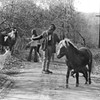Published March 9, 2005 at 5:00 p.m.
When Aida Sehovic's family left Banja Luka in 1992, the bloody conflict that would soon devastate the former Yugoslavia had not yet reached them. But their ethnically diverse city, about 85 miles northwest of Sarajevo, was already transformed. Her family was Muslim, and it was no longer safe for them to remain in their homeland.
"People thought the war would never get there," explains Sehovic, now a 28-year-old Burlington artist and filmmaker. "Everyone was so intermarried. It all seemed beyond. Then, they woke up one morning to discover that their next-door neighbor, a Serb, was no longer talking to them. There were barricades. School closings."
She came to the United States in 1997, by way of Turkey and Germany, through the refugee resettlement program. Last summer Sehovic returned to the Balkans with her American boyfriend, University of Vermont senior Gates Gooding, to shoot Bosnia, After Everything. The 59-minute documentary, which had its first public screening two weeks ago at UVM, examines the current reality for young people in the still-beleaguered country.
The couple spent six weeks in Bosnia and Herzegovina, as one segment of the splintered nation is now called. But Banja Luka was off-limits. "Technically I could go back to the region where I'm from, but it would still be really dangerous," Sehovic notes.
Gooding, a Colorado native, is a geography major but studied at New York University's film school in his sophomore year. During that time Sehovic attended the School of Visual Arts in Manhattan. She graduated UVM in 2002.
The idea for their cinematic collaboration came in the fall of 2003. "I did an independent study about Bosnia to prepare," says Gooding, 22. He funded the project with a $4000 UVM grant and private donations.
With a Panasonic digital video camera, they flew to Eastern Europe. In her luggage, Sehovic was also schlepping 200 porcelain coffee cups, representing a small percentage of victims so far identified from a 1995 massacre in Srebrenica. On the ninth anniversary of the event she used the cups to create an installation, resembling a map of the country, in the dirt of a Sarajevo town square. Sehovic and Gooding chronicled that daylong effort in a short doc, For Those Who Aren't Here.
The symbolism was significant. "In Bosnian society, it's considered very intimate and personal when someone invites you for coffee," Sehovic says.
She was 15 when her family moved away, so the journey back was a revelation. They encountered a range of Bosnians -- a cab driver, an artisan, an athlete, a former soldier who happens to be Sehovic's cousin -- willing to discuss their views of the future in a country plagued by bureaucracy, corruption, economic woes and continuing ethnic tensions.
Many of those interviewed envision immigrating elsewhere. One man pledges to stay because if he left, surviving the genocidal madness "would all be for nothing." Neither option is easy.
In a traditionally patriarchal culture, the job market favors older men. Consequently, there is a 50 percent unemployment rate among Bosnian youth. Drugs and alcohol are prevalent. Landmines dot the rural and urban terrain. Pessimism rules.
"I could have been one of those people if my path hadn't gone another way," Sehovic observes. "Film is a powerful tool. I would never have had such conversations otherwise."
"She was discovering her country along with me," Gooding says.
They returned with 30 hours of footage -- a tenth the amount typically shot for a documentary. "It was only in the editing process we began to think we had something valuable," Sehovic says. They devoted five months to shaping the finished product, which was greeted with a standing ovation at its UVM premiere. The crowd included many local Bosnians.
"We'd like to show it at the Sarajevo Film Festival in August," Gooding notes. There's also a free screening at 5:40 p.m. on March 13 at the Roxy in downtown Burlington.
Meanwhile, Sehovic's parents have to contend with more than 1000 coffee cups -- the final tally used for her installation -- that she has stored in their basement. They may still bear traces of Sarajevo soil.
More By This Author
Speaking of Movies
-

Next Month Brings the Final Curtain for Palace 9 Cinemas
Oct 27, 2023 -

Book Review: 'Save Me a Seat! A Life With Movies,' Rick Winston
Aug 30, 2023 -

Steve MacQueen Named Executive Director of Vermont International Film Festival
May 22, 2023 -

Vermonters Are Going Back to the Movies — Under the Stars
Aug 26, 2020 -

Where to Catch a Movie Near Burlington
Sep 11, 2018 - More »
Comments
Comments are closed.
From 2014-2020, Seven Days allowed readers to comment on all stories posted on our website. While we've appreciated the suggestions and insights, right now Seven Days is prioritizing our core mission — producing high-quality, responsible local journalism — over moderating online debates between readers.
To criticize, correct or praise our reporting, please send us a letter to the editor or send us a tip. We’ll check it out and report the results.
Online comments may return when we have better tech tools for managing them. Thanks for reading.








































